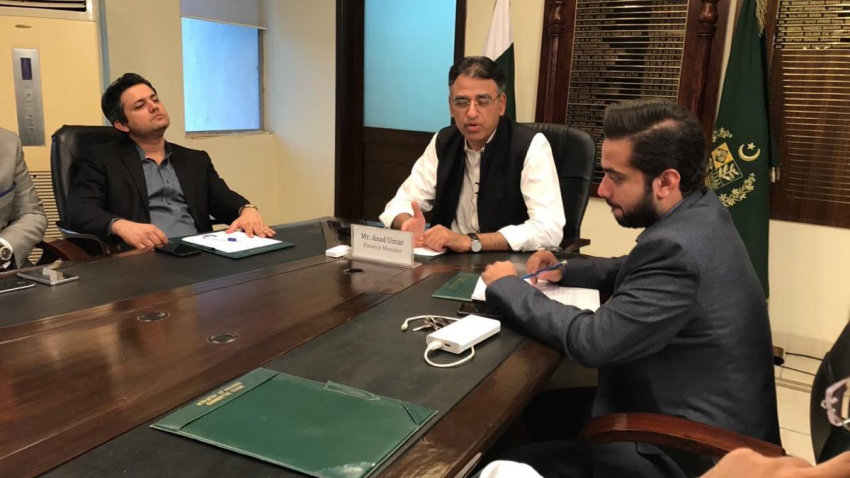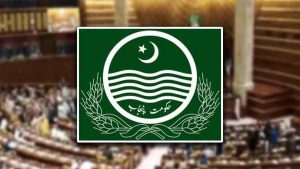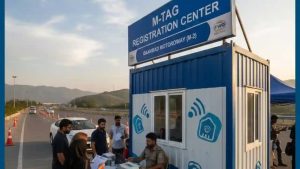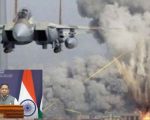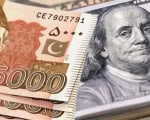ISLAMABAD – Finance Minister Asad Umar expressed on Wednesday that there will be a growth from year three onward, but it will be sustainable and long term.
Addressing a live Question and Answer session on the state of the country’s economy, the ministers addressed queries from journalists and defended the economic moves made in recent times.
When the Daily Pakistan correspondent asked him about a recent hike in petroleum prices and Umar’s suggestion that petrol prices should be set at Rs46 a litre during the PML-N government, he disputed the claim.
“I had never said that petrol should be Rs46 per litre. I had said that the tax should be lower than it was,” he said and clarified that the tax ratio at the time was 52pc [of the total price of petrol], as compared to current 30pc.
The lawmaker opined that had the government kept the same taxes as before, Rs97bn more would have been collected silently from the Pakistani public.
https://www.facebook.com/DailyPakistan.OfficialPage/videos/312837936302726/
When asked about the proposal to introduce another amnesty scheme and the earlier criticism at the scheme by himself and other PTI leaders, the finance minister admitted that the idea of amnesty schemes was a controversial one, but added that it was the need of the time due to the prevalent system.
“You can say that it facilitates tax evaders, which will be a fair point. In my viewpoint, my previous objections are valid today as well,” he said while standing his ground.
Umar said the majority’s view is that the tax amnesty should be offered to give people a chance to come into the tax net.
“If the amnesty scheme does come, public officers and civil servants will not be eligible for it, even though some journalists have pointed out that they have the most money,” he said.
Umar highlighted a couple of reasons for the cash-strapped economy but assured that there will be light at the end of the tunnel.
The minister observed that he was asked queries about growth during his visit to Pakistan Stock Exchange and himself replied that he had replied that we will go through a stabilisation period of two years after six months of extreme turbulence following which there will be growth.
“There are two reasons budget deficit and external deficit behind the economic mess and to resolve this you either need to enhance exports or decrease imports. Our immediate action was to lessen imports, which slows down the economy,” Umar said.
The finance minister likened the economy and the political fallout of the government’s economic policies to a patient being operated on.
“It seems [to an observer] that he [the patient] has been cut open by a man with a knife, but the fact is that he [the patient] is being operated on by a surgeon,” Umar added.
To a query about how the government will deliver on its promise to create two million jobs a year as growth slows, Umar acknowledged the criticism.
“They say that if the economy does not grow at seven per cent, two million jobs won’t be created. As a rule of thumb that [reasoning] is fine, but job creation also depends on priorities,” he explained.
Umar shared that tourism, small and medium enterprises (SMEs), information technology (IT), and housing all are the priorities, and all of them have the potential of job creation.
“Now that we are out of the fight for survival zone, the purse strings will be loosened,” Umar said and claimed that things were improving now.
Asad Umar also defended the government’s decision to not rush into an International Monetary Fund (IMF) programme at the start of its tenure in July last year.
“Is the economy in this state for the first time in Pakistan?” he questioned and answered that we have two world records: one in trolling and the other in entering IMF programmes.
“I talked to IMF officials and told them that I don’t want to burden my nation with more loans. They told me that the situation we have inherited has never been inherited by anyone else,” he claimed, explaining why the government had to take that option.
“They used to say that the IMF programme should be taken immediately so that markets do not run away. After six months, our reserves are in a better shape,” he shared and confirmed that an agreement will be reached soon.
When asked about the discovery of huge oil reserves in the country, the finance minister explained that work was underway and the expectation is that discovery, if made, will be significant.
“There is deep offshore drilling underway some 250km away from [the coast of] Pakistan. They have to drill 5,000m deep, of which, last I checked, 3,500m had been drilled. There was some delay owing to a rocky formation which changed the approach. When they finally reach 5,000m, we will know what the find is. But we know that its potential is big. It’s a high-risk operation, and ExxonMobil invests when a potential find is massive,” he announced.
When reminded about his statement about bringing Paypal to Pakistan, Umar asked his team to follow up on those plans.
“The IT ministry was given the task. They had to go in January. It hasn’t been done so far, but we are trying. But AliPay is already here,” he said while striking a less definite tone.
To a query about why the Federal Board of Revenue (FBR) has not done enough to raise awareness regarding tax benefits and incentives that come with entering the tax net, Umar asked Minister for Revenue Hammad Azhar to respond.
“It’s right that FBR’s optics are lacking. There is a lot of work to be done and there is an awareness deficit. We did do a concerted advertisement campaign, following which a 34 per cent increase was witnessed in on-time filing. But we should do a sustained campaign,” Azhar replied.
Asad Umar said the issue of rising inflation would be taken up in the upcoming meeting of the Economic Coordination Committee (ECC).
Umar maintained that the incumbent government’s performance was better than the former administrations adding that in PML-N’s first year there was double-digit inflation which has not been seen so far [in our tenure].
“When one attempts to move out of a balance of payment crisis, inflation rises. During PML-N’s tenure, inflation was borne mostly by the lowest income class but now the rich have suffered,” he argued.
Umar also cited the observation of economist Hafeez Pasha according to which under the PPP, unemployment increased, and under the PML-N, it increased even more sharply.
“If you observe the textile industry, the people who had exited the industry are actually coming back,” he said.

